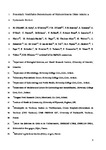Potentially modifiable determinants of malnutrition in older adults: A systematic review.
| dc.contributor.author | O'Keeffe, M | |
| dc.contributor.author | Kelly, M | |
| dc.contributor.author | O'Herlihy, E | |
| dc.contributor.author | O'Toole, PW | |
| dc.contributor.author | Kearney, PM | |
| dc.contributor.author | Timmons, S | |
| dc.contributor.author | O'Shea, E | |
| dc.contributor.author | Stanton, C | |
| dc.contributor.author | Hickson, Mary | |
| dc.contributor.author | Rolland, Y | |
| dc.contributor.author | Sulmont Rossé, C | |
| dc.contributor.author | Issanchou, S | |
| dc.contributor.author | Maitre, I | |
| dc.contributor.author | Stelmach-Mardas, M | |
| dc.contributor.author | Nagel, G | |
| dc.contributor.author | Flechtner-Mors, M | |
| dc.contributor.author | Wolters, M | |
| dc.contributor.author | Hebestreit, A | |
| dc.contributor.author | De Groot, LCPGM | |
| dc.contributor.author | van de Rest, O | |
| dc.contributor.author | Teh, R | |
| dc.contributor.author | Peyron, MA | |
| dc.contributor.author | Dardevet, D | |
| dc.contributor.author | Papet, I | |
| dc.contributor.author | Schindler, K | |
| dc.contributor.author | Streicher, M | |
| dc.contributor.author | Torbahn, G | |
| dc.contributor.author | Kiesswetter, E | |
| dc.contributor.author | Visser, M | |
| dc.contributor.author | Volkert, D | |
| dc.contributor.author | O'Connor, EM | |
| dc.contributor.author | MaNuEL consortium, | |
| dc.date.accessioned | 2019-03-20T15:09:12Z | |
| dc.date.issued | 2018-12-11 | |
| dc.identifier.issn | 0261-5614 | |
| dc.identifier.issn | 1532-1983 | |
| dc.identifier.uri | http://hdl.handle.net/10026.1/13505 | |
| dc.description.abstract |
BACKGROUND & AIMS: Malnutrition in older adults results in significant personal, social, and economic burden. To combat this complex, multifactorial issue, evidence-based knowledge is needed on the modifiable determinants of malnutrition. Systematic reviews of prospective studies are lacking in this area; therefore, the aim of this systematic review was to investigate the modifiable determinants of malnutrition in older adults. METHODS: A systematic approach was taken to conduct this review. Eight databases were searched. Prospective cohort studies with participants of a mean age of 65 years or over were included. Studies were required to measure at least one determinant at baseline and malnutrition as outcome at follow-up. Study quality was assessed using a modified version of the Quality in Prognosis Studies (QUIPS) tool. Pooling of data in a meta-analysis was not possible therefore the findings of each study were synthesized narratively. A descriptive synthesis of studies was used to present results due the heterogeneity of population source and setting, definitions of determinants and outcomes. Consistency of findings was assessed using the schema: strong evidence, moderate evidence, low evidence, and conflicting evidence. RESULTS: Twenty-three studies were included in the final review. Thirty potentially modifiable determinants across seven domains (oral, psychosocial, medication and care, health, physical function, lifestyle, eating) were included. The majority of studies had a high risk of bias and were of a low quality. There is moderate evidence that hospitalisation, eating dependency, poor self-perceived health, poor physical function and poor appetite are determinants of malnutrition. Moderate evidence suggests that chewing difficulties, mouth pain, gum issues co-morbidity, visual and hearing impairments, smoking status, alcohol consumption and physical activity levels, complaints about taste of food and specific nutrient intake are not determinants of malnutrition. There is low evidence that loss of interest in life, access to meals and wheels, and modified texture diets are determinants of malnutrition. Furthermore, there is low evidence that psychological distress, anxiety, loneliness, access to transport and wellbeing, hunger and thirst are not determinants of malnutrition. There appears to be conflicting evidence that dental status, swallowing, cognitive function, depression, residential status, medication intake and/or polypharmacy, constipation, periodontal disease are determinants of malnutrition. CONCLUSION: There are multiple potentially modifiable determinants of malnutrition however strong robust evidence is lacking for the majority of determinants. Better prospective cohort studies are required. With an increasingly ageing population, targeting modifiable factors will be crucial to the effective treatment and prevention of malnutrition. | |
| dc.format.extent | 2477-2498 | |
| dc.format.medium | Print-Electronic | |
| dc.language | en | |
| dc.language.iso | en | |
| dc.publisher | Elsevier | |
| dc.subject | Determinants | |
| dc.subject | Malnutrition | |
| dc.subject | Older adults | |
| dc.subject | Prospective cohort studies | |
| dc.subject | Systematic review | |
| dc.title | Potentially modifiable determinants of malnutrition in older adults: A systematic review. | |
| dc.type | journal-article | |
| dc.type | Journal Article | |
| dc.type | Research Support, Non-U.S. Gov't | |
| dc.type | Systematic Review | |
| plymouth.author-url | https://www.ncbi.nlm.nih.gov/pubmed/30685297 | |
| plymouth.issue | 6 | |
| plymouth.volume | 38 | |
| plymouth.publication-status | Published | |
| plymouth.journal | Clinical Nutrition | |
| dc.identifier.doi | 10.1016/j.clnu.2018.12.007 | |
| plymouth.organisational-group | /Plymouth | |
| plymouth.organisational-group | /Plymouth/Faculty of Health | |
| plymouth.organisational-group | /Plymouth/Faculty of Health/School of Health Professions | |
| plymouth.organisational-group | /Plymouth/REF 2021 Researchers by UoA | |
| plymouth.organisational-group | /Plymouth/REF 2021 Researchers by UoA/UoA03 Allied Health Professions, Dentistry, Nursing and Pharmacy | |
| plymouth.organisational-group | /Plymouth/Research Groups | |
| plymouth.organisational-group | /Plymouth/Research Groups/Institute of Health and Community | |
| plymouth.organisational-group | /Plymouth/Research Groups/Plymouth Institute of Health and Care Research (PIHR) | |
| plymouth.organisational-group | /Plymouth/Users by role | |
| plymouth.organisational-group | /Plymouth/Users by role/Academics | |
| dc.publisher.place | England | |
| dcterms.dateAccepted | 2018-12-05 | |
| dc.rights.embargodate | 2019-3-27 | |
| dc.identifier.eissn | 1532-1983 | |
| dc.rights.embargoperiod | Not known | |
| rioxxterms.versionofrecord | 10.1016/j.clnu.2018.12.007 | |
| rioxxterms.licenseref.uri | http://www.rioxx.net/licenses/all-rights-reserved | |
| rioxxterms.licenseref.startdate | 2018-12-11 | |
| rioxxterms.type | Journal Article/Review |


